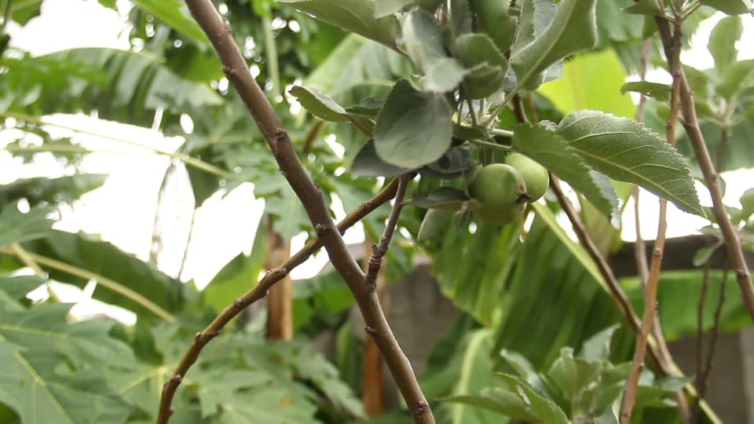The saying, “Never say die until the bones are rotten” reverberated well when I read the news about Ghana’s potential to grow apples.
For as long as I have lived, that possibility has always been dismissed with the emphatic assertion that our climate does not favour the cultivation of the fruit. Apples have continued to be imported into the country and despite the price, the fruit gets well patronised with a market for it even on the streets because of its dietary benefits.
Discovery of the year
Excited with the news, I am prompted to propose a discovery of the year award for the Crops Research Institute (CRI) of the Council for Scientific and Industrial Research (CSRI) for successful experimentation on the potential production of apple in the country. Alongside that, the star of the discovery goes to the proponent of the initiative, Edward Akwasi Fosu, said to be a technical Assistant with a private firm in Antwerpen, Belgium.
According to a news report that made the rounds a couple of weeks ago, the experiment on the edible apple, “Malus domestica” had been on-going in the last two years at Atmatim-Taaboum in the Kwabre-East District of the Ashanti Region. The plant apparently started fruiting two years after planting.

Though a progressive piece of news that should have been given all the limelight to generate wider discussion by interest groups, it did not. The story seems to have got buried under the depressing news of coronavirus and the politics of the December general election, not to mention the growing incidence of invoking curses. It is regrettable that such progressive news items do not often get their place of pride.
Super fruit
So everything is possible on our Ghana soil. We turn to be cynical and easily dismiss attempts that could open doors even when we have scientific proof. Hopefully this new discovery would not be shelved in view of its pride of place for the country as a super fruit and the possibility of creating jobs locally rather than importing from elsewhere.
The importation of rice and sugar for example, are most of the time cited when we talk about unnecessary or reduced food imports. We have arable lands to cultivate healthy and tasty rice yet we prefer to import the product from elsewhere. For years, we have spent billions of dollars to bring in rice from other parts of the world, mostly from the East and thus supporting their economies.
As per available statistics, since 2015, Ghana has imported over $1,162 billion worth of rice into the country while local rice farmers struggle for funding to perfect their produce. What these scarce resources could have done for our economy is anybody’s guess.
Now that the potential to grow apples here in Ghana has been established, we should begin to avail our minds to identifying areas around the country where the discovery could be piloted on large scale. We have cooler weather conditions all year round in places like Aburi and the Kwahu range that may support large scale production of apples.
Planting for food and jobs
On pilot basis, we could begin to experiment the growing of not only apples but also some of those food items that require cooler weather conditions and which we have readily dismissed in the past as impossible. That should be a challenge to be taken up as part of our planting for food and jobs agenda.
Currently, the country imports apples from Europe and South Africa. The country’s importation of foreign fruits like apples and pears has been estimated at about $7.27m, according to a 2018 UN database on international trade. Thus being a market for apples is not in dispute and that is why we should not allow this potential to whittle away.
It is often said that an apple a day, keeps the doctor away and there is a reason for that. Apples are said to be rich in potassium, fiber, vitamin C, B-6 and magnesium. It is said to be good for the heart and for overall wellness. The opportunity to make this super fruit readily available is here. A further opportunity is to create jobs for those who want to go into its cultivation and possibly processing.
One looks forward to the CRI and the Ministry of Agriculture working actively on the discovery and pushing it ahead on the Planting for Food and Jobs agenda.
Writer’s email: vickywirekoandoh@yahoo.com
Latest Stories
-
Pyramids beat Sundowns to win first-ever CAF Champions League title
5 minutes -
Pyramids FC win CAF Champions League following 2nd leg victory over Sundowns
8 minutes -
Pyramids FC clinch first CAF Champions League title with victory over Mamelodi Sundowns
36 minutes -
Nations FC cite “poor officiating” and “security lapses” as reasons for abandoning Basake Holy Stars match
44 minutes -
Breaking the cycle: School girls in Techiman unite against child marriage, demand menstrual dignity
1 hour -
2024/25 GPL: Hearts dispatch relegated Legon Cities
2 hours -
2024/25 GPL: Samartex edge Aduana Stars 2-1 in final home game
2 hours -
GPL 2024/25: Karela United thump Accra Lions at home
2 hours -
Prof. Kwaku Asare shoots down Fiscal Council proposals
2 hours -
2024/2025 GPL: Holy Stars, Nations FC game abandoned after violence
2 hours -
GPL 2024/25: Heart of Lions keep slim title hopes alive with win over Bechem
2 hours -
2024/25 GPL: GoldStars beat Berekum Chelsea to enhance title hopes
2 hours -
From superstars to synergy: What PSG teaches us about success, ego, and building systems that work
2 hours -
2024/25 GPL: Accra Lions relegated following defeat to Dreams FC
2 hours -
GPL 2024/25: Albert Amoah hits hat-trick as Asante Kotoko beat Medeama
3 hours

